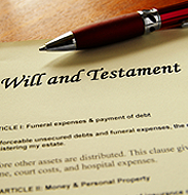
Virginia Law & Wills
If you are married with children, and the only children around are the biological or adoptive children of you and your spouse, and you die without a Will, then your spouse will inherit everything. Most people want that anyway. BUT if any of your children have a parent other than your surviving spouse, only one-third of your estate will go to your spouse and the remainder will be split among your children.
If you are not married and have no descendants, your parents will inherit your estate. If neither of your parents is living, other specified family members will inherit your estate. The possibility of the proverbial “laughing heir” is very real here. (The “laughing heir” is a very distant relative who does not know you, does not care about you, but will gladly take the money generated by the sale of the assets of your estate, laughing all the way to the bank.) If you are single and have no children, you may wish your estate to go to a close friend, a life partner, a charity or other non-profit organization before it goes to relatives unknown. That will happen only if you have a Will.
* (By the way, it is simply not true that if you die without a Will your estate automatically goes to the state. It goes to your relatives. If no relatives of yours can be found within the appropriate degree of relationship, then it is possible that the state would receive the assets of your estate, but that is an extremely rare circumstance.)
Of Course You Still Need A Will…
So let’s say you have no minor children for whom a guardian should be appointed, and the intestate distribution we described above is just what you had in mind. In that case you don’t need a Will, correct? Well, here the call becomes more difficult. Here are three more issues you may wish to consider:
1. If you die without a Will, an administrator will be appointed to manage your estate. Generally, it will be a family member. But in order to serve, he or she will have to pay for a surety bond. This is a cost that can be avoided with a Will, which would waive any requirement that a bond be posted. If your estate is, let’s say, $200,000, the bond can run close to $1,000. Of course, the money is not ‘yours’ anymore (given that you will be dead and all), but saving that money for your heirs is something for you to consider.

 In addition to issues above, you may want to make a gift at your death to a favorite charity: your house of worship, your alma mater, a general charity such as the Red Cross or a specific charity whose purpose is to find cures for diseases (e.g., American Cancer Society, Alzheimer’s Association, etc.), or advance other important causes. You can favor any charity of your choice within the body of a Will.
In addition to issues above, you may want to make a gift at your death to a favorite charity: your house of worship, your alma mater, a general charity such as the Red Cross or a specific charity whose purpose is to find cures for diseases (e.g., American Cancer Society, Alzheimer’s Association, etc.), or advance other important causes. You can favor any charity of your choice within the body of a Will.